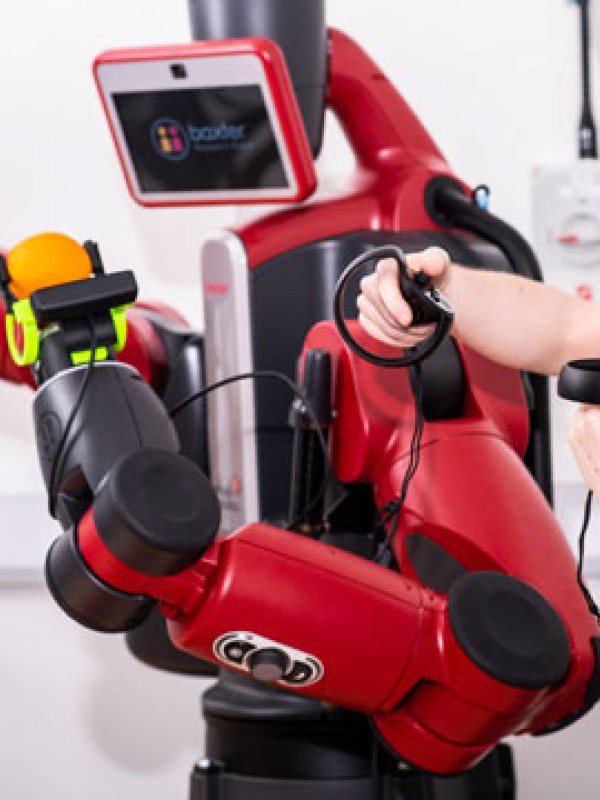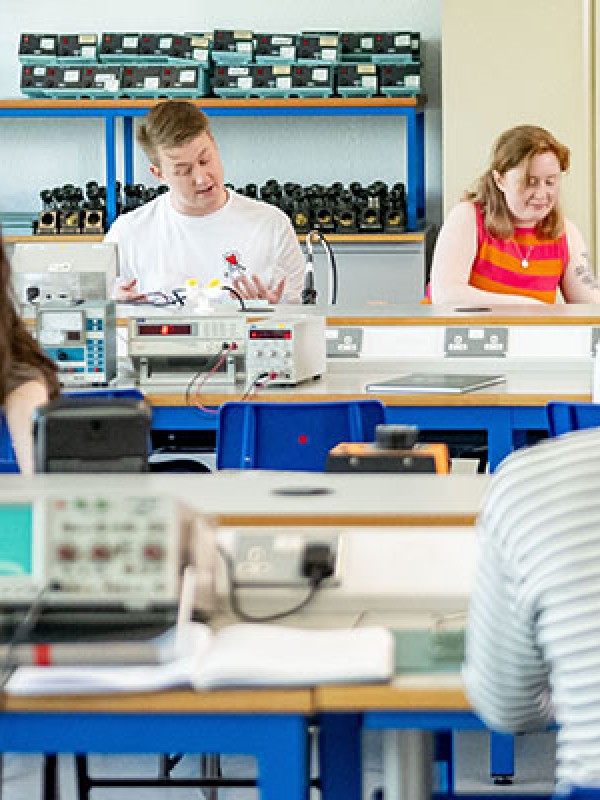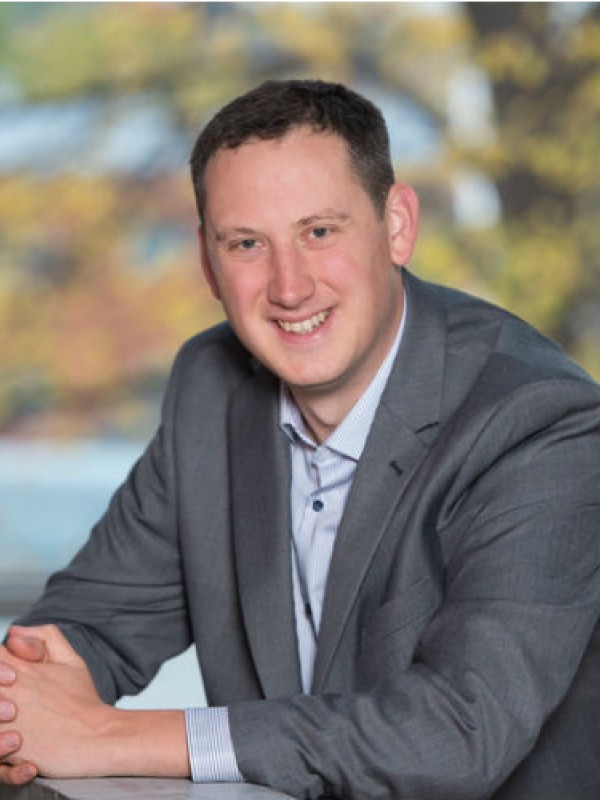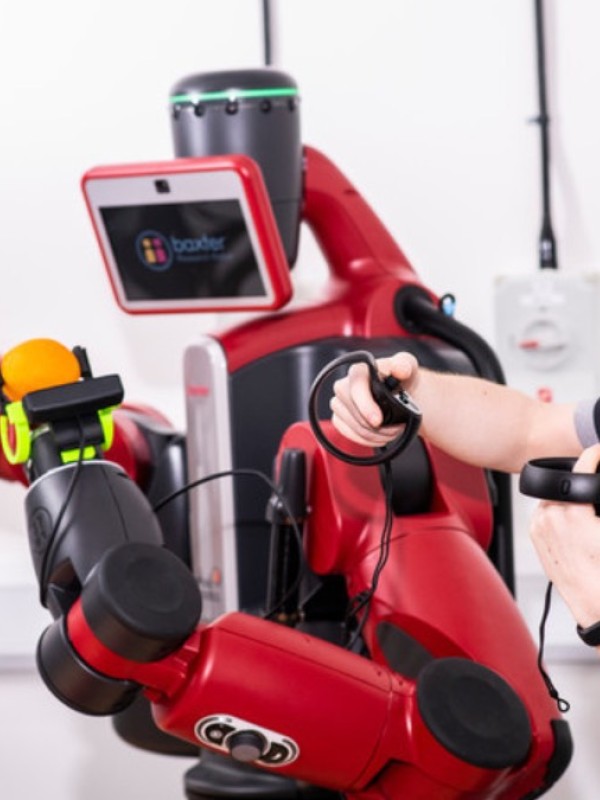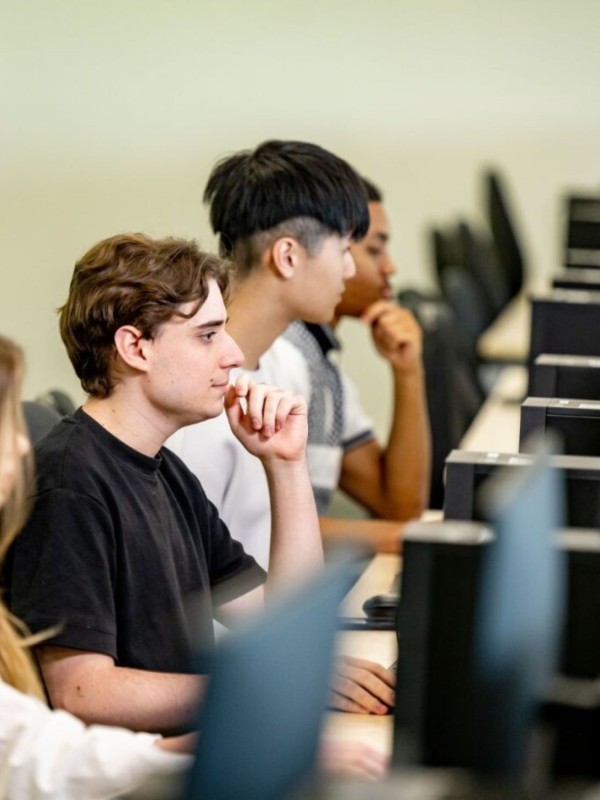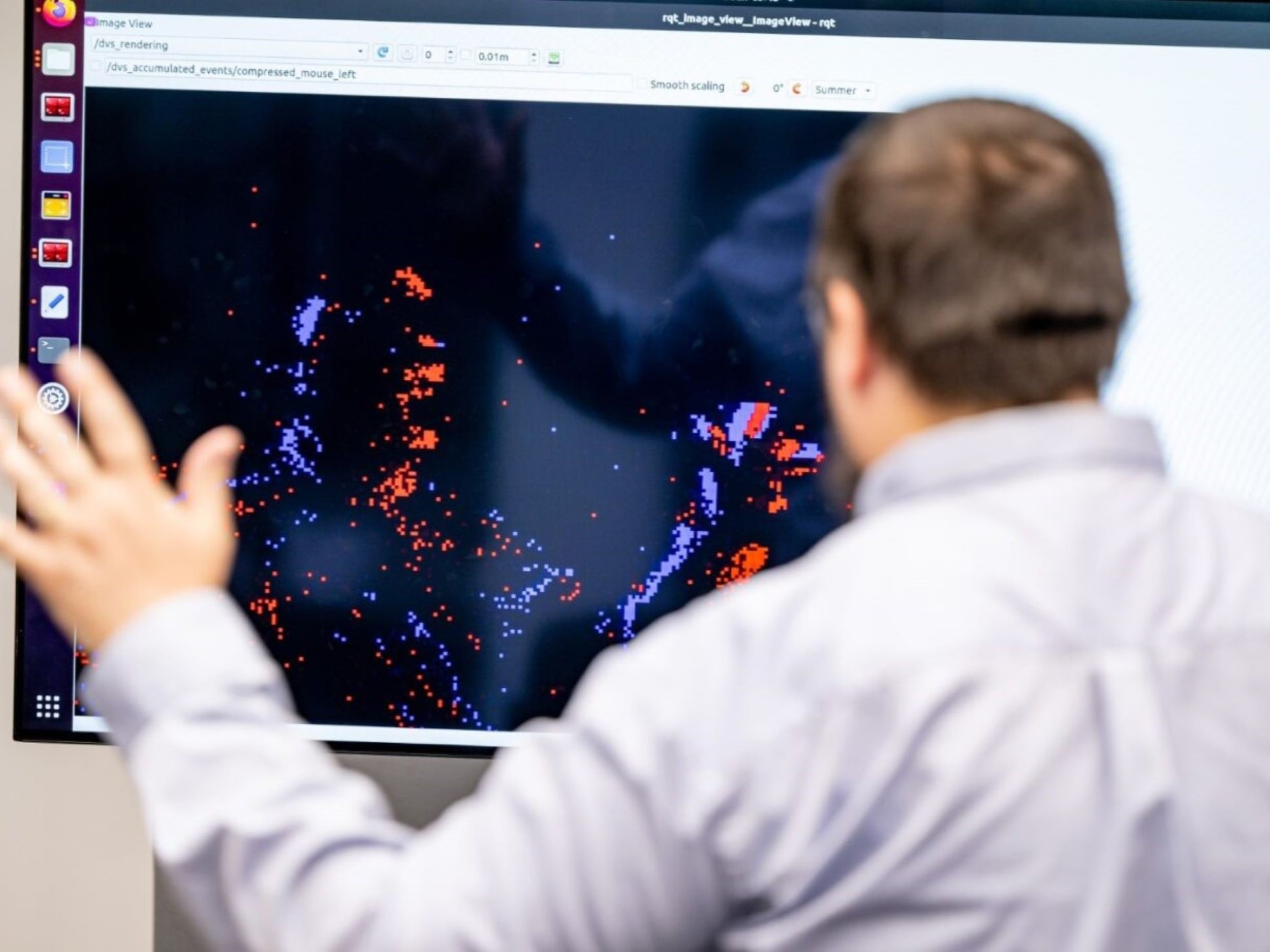
- Computer Vision, Robotics and Machine Learning
MSc — 2026 entry Computer Vision, Robotics and Machine Learning
Our Computer Vision, Robotics and Machine Learning MSc is designed for those interested in pursuing careers in robotics research, autonomous systems development, computer vision engineering, and related fields. This course will provide you with in-depth training and hands-on learning experiences necessary to succeed in this sector.
4,138+ people have created a bespoke digital prospectus
Why choose
this course?
If you’re intrigued by artificial intelligence (AI), the application of robotics and creating machines that can ‘see’, then this MSc is for you.
You will be taught by academics from our Centre for Vision, Speech and Signal Processing (CVSSP), which is internationally recognised for its research in computer vision, multimedia signal processing and machine learning. With a diverse community of more than 120 researchers, CVSSP is one of the largest and most respected vision research groups in the UK.
Statistics
Ranked 1st in the UK
And 4th in Europe for Computer Vision in the Computer Science Rankings (CS Rankings) 2025
Top 100 in the world
For computer science and engineering in the ShanghaiRanking's Global Ranking of Academic Subjects 2025
Accreditation
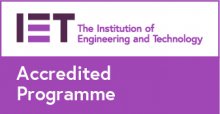
What you will study
Our Computer Vision, Robotics and Machine Learning MSc will provide you with in-depth training and hands-on learning experiences. It’s well-suited to anyone interested in a career in research-oriented institutions or pioneering technology companies that specialise in deep and machine learning, robotics and automation, and image and video analysis.
On this course, you’ll explore advanced computer vision and machine learning approaches for image and video analysis, as well as low-level image processing methods.
You’ll also have the opportunity to substantially expand your programming skills through the projects you choose to take on.
Professional recognition
MSc - Institution of Engineering and Technology (IET)
Accredited by the Institution of Engineering and Technology (IET) on behalf of the Engineering Council for the purposes of fully meeting the academic requirement for registration as an Incorporated Engineer and partially meeting the academic requirement for registration as a Chartered Engineer.
Industrial collaborations
We draw on our industry experience to inform and enrich our teaching, bringing theoretical subjects to life. We have collaborated with industrial partners such as the BBC, Foundry, LionHead and BAE on research and technology transfer projects.
Several of our academics offer MSc projects in collaboration with our industrial partners.
Research
Our Centre for Vision, Speech and Signal Processing is internationally renowned, with more than 120 researchers working in the fields of deep learning, computer vision, signal processing and robotics. Their forward-thinking research is reflected in the course content, which is frequently updated with the latest developments.
Uniquely, our robotics material is inspired by our Surrey Space Centre, building on our specialisms in space robotics.
Facilities
Several modules on our course are supported by laboratory classes. Here, you’ll gain hands-on experience in artificial intelligence programming and develop practical skills in the design of robotic devices.
We’ll provide you with computing support for any specialised software (e.g. MATLAB) required during the course. The faculty’s student common room is also covered by the University’s open-access wireless network, which makes it a popular location for individual and group work using laptops and mobile devices.
Specialist experimental and research facilities, for computationally demanding projects or those requiring specialist equipment, are provided by our Centre for Vision, Speech and Signal Processing.
If you’re studying this course full-time, you’ll study eight modules across the year – four in each semester. You will work on your project full-time during the summer period for approximately two-and-a-half months, and prior to that, during semester time, you will work on the initial stages of the project part-time and complete an interim report. This means that if you begin your course in February, you will complete your project in between the two semesters, and if you begin your course in September, you will complete your project after the two semesters.
You can also study this MSc part-time, taking between two and five years. You can study between two and six modules each year and the length taken to complete the MSc depends on how many modules you choose. We recommend part-time students work on their project in their final year of study when all eight modules have either been completed or are near completion.
The structure of our programmes follows clear educational aims that are tailored to each programme. These are all outlined in the programme specifications which include further details such as the learning outcomes:
Modules
Modules listed are indicative, reflecting the information available at the time of publication. Modules are subject to teaching availability, student demand and/or class size caps.
The University operates a credit framework for all taught programmes based on a 15-credit tariff, meaning all modules are comprised of multiples of 15 credits.
Course options
Year 1
Semester 1
Compulsory
Expected prior learning: Module EEE3008–Fundamentals of Digital Signal Processing or equivalent learning about signal processing. Module purpose: The module discusses basic concepts, signal processing methods and human computer interaction applications of speech processing and recognition including auditory perception and psychoacoustics. You will be taught how to extract salient features from speech signals, how to design a model of spoken language, how to perform recognition and training, and given an insight into current research on spontaneous speech recognition, such as speaker adaptation and solutions for robustness to noise. Demonstrations, interesting illustrations and working examples will be given. Successful students can either proceed to do PhDs or get jobs in the R & D departments of industry, i.e. jobs that are at a higher level than mere software package operators. The presented techniques have many other applications beyond speech, including expert systems and financial modelling. Module EEEM030 contributes to the development of student’s knowledge in audio and speech processing and recognition, which may be useful for their taking of other modules such as: EEEM071 Advanced Topics in Computer Vision and Deep Learning EEEM004 60 Credit Standard Project EEEM005 AI and AI Programming EEEM066 Fundamentals of Machine Learning EEEM067 AR, VR and Metaverse EEEM068 Applied Machine Learning Module EEEM030 contributes to student knowledge in audio and speech processing and thus useful for students taking 60 credit project (EEEM004) related to audio and speech processing and recognition. EEEM030 is related to EEEM005, EEEM066 and EEEM068 due to the fact that machine learning/AI techniques are used for speech and speaker recognition, therefore, EEEM030 contributes to the development of student knowledge in machine learning/AI, which is beneficial for their taking of machine learning and AI related modules such as EEEM005, EEEM066 and EEEM068. One of the applications of audio and speech processing is to apply it to AR, VR and Metaverse for spatial sound production and reproduction which is a key enabling technology for AR, VR, and Metaverse, for virtual sound reproduction. Therefore, knowledge gained from EEEM030 would be useful for the taking of the module EEEM067. Module EEE030 also benefits from knowledge gained from other modules such as: EEE3008 Digital Signal Processing EEE1033 Computer and Digital Logic EEE1035 Programming in C EEE3042 Audio and Video Processing EEE3032 Computer Vision and Pattern Recognition The modules EEE1033 and EEE1035 provide students with some useful skills in programming, which will be beneficial for them to complete the computer programming based coursework components, by turning the signal processing theories and methods into working program codes. The module EEE3008 provides students with knowledge and skills on fundamental digital signal processing skills which are essential in understanding the application of these skills to audio and speech data. EEE3042 covers both audio and video processing and coding, and the audio related materials are highly relevant and thus useful for the EEEM030 module. The pattern recognition skills gained from EEE3032 would be useful for understanding the use of pattern recognition algorithms to speech data for achieving speech and speaker recognition.
View full module detailsOptional
Expected prior learning: Knowledge of basic properties of signals and related methods, including Fourier series, Fourier transforms, Laplace transforms, and convolution. BEng/MEng students might have acquired this through study of module EEE2035 Engineering Mathematics III and/or module EEE2033 Circuits, Control and Communications. MSc students might have acquired this through study of an undergraduate module on “Signals and Systems” or through independent study. Module purpose: This introductory course in Digital Signal Processing explores mathematical tools used to represent, analyse and design basic DSP systems. This module underpins many key areas of digital systems, including audio-visual technology, digital communications, control systems, and computer vision. This topic is therefore of paramount importance to any electronic engineer. This module EEE3008 provides the expected prior learning for the following module EEEM030 Speech & Audio Processing and Recognition Taking module EEE3008 may also contribute to a deeper understanding of the following modules EEE3032 Computer Vision and Pattern Recognition, EEE3042 Audio and Video Processing and EEEM071 Advanced Topics in Computer Vision and Deep Learning
View full module detailsExpected prior learning: None specifically advised. Module purpose: Earth and planetary observation with remote sensing data is playing a key role in the present understanding of natural phenomena, prevention of disasters, resources monitoring, comprehension of origins of life. Through a series of lectures, seminars, open discussions and “thinking breaks” in class, the module aims to give an introduction to the scientific principles of remote sensing – both passive and active – as carried out by spacecraft. Remote sensing is discussed in terms of instrumentation, missions, products and applications. IMPORTANT: The Second assessment pattern (Written Exam) is only applicable to the MSc Short Course Students.
View full module detailsExpected prior learning: Module EEE2041 – Computer Vision & Graphics, or equivalent learning about the geometric interpretation of Linear Algebra (e.g. homogeneous coordinates and matrices for point transformation e.g. rotation, translation, scaling). Module purpose: The module delivers a grounding in Computer Vision, suitable for students with a grounding in linear algebra similar to that provided by EEE2041 – Computer Vision & Graphics) and will help with modules such EEEM071 Advanced Topics in Computer Vision and Deep Learning. Content is presented as an application-focused tour of Computer Vision from the low-level (image processing), through to high level model fitting and object recognition.
View full module detailsMedical robotics is a rapidly developing industry that is vital to healthcare systems seeking better outcomes at reduced overall cost. This module introduces students to the workings of robots and how this is applied in solving both surgical and broader healthcare challenges. Students learn through lectures, practical sessions, tutorials and seminars requiring engagement with scientific literature. Case studies are a critical part of the module. These are industrially or research-based and require students to think about clinical conditions, ethical considerations and a range of attitudes to healthcare.The unit of assessment requires students to develop an understanding of the general theory behind robotics and identify the particularities applying to medical robots. The unit of assessment will also address the wider issues associated with medical robotics and their application. Practical sessions enable students to work with each other to solve problems and demonstrate the theoretical components of the module. An overarching series of lectures delivers critical technical information and links students¿ learning with case-studies to illustrate mechanical and medical issues. Seminars complement lectures and are designed for students to critically analyse, discuss and focus on particular aspects of medical robotic research in the scientific literature.
View full module detailsModule purpose: Advances related to energy efficiency issues and cost reductions have resulted in the rapid growth and deployment of networked devices and sensing/actuation systems that connect the physical world with the cyber world. This evolving framework, now recognized as the Artificial Intelligence of Things (AIoT), integrates IoT technologies with artificial intelligence (AI) to enhance automation, intelligence, and decision-making. AIoT incorporates several cutting-edge technologies, including wireless sensor networks, pervasive systems, ambient intelligence, context awareness, distributed systems, and machine learning-driven analytics. Module Overview: The advanced AIoT module is designed to provide a comprehensive understanding of how machine communications , coupled with AI, contribute to creating smart artificial intelligence-driven environments, focusing on networking and communication systems. The module provides an overview of the key concepts and enabling technologies for AIoT. It encompasses a cross-layer approach, allowing students to explore the practical aspects of sensors, actuators, and mainly communication systems for AIoT across physical, media access, and network layers. This includes security considerations, satellite AIoT, positioning and tracking for industrial applications, AIoT Platforms (Hardware, Software), protocols and standards (e.g. 6LowPAN, ZigBee, CoAp), semantic technologies, and data and information processing mechanisms. Also, the module explores AI-driven methodologies such as ensemble learning, multi-armed bandits for sequential decision-making, and lightweight machine learning Mmodels for AIoT applications. These techniques enhance real-time data analysis, predictive maintenance, anomaly detection, and adaptive control while ensuring computational efficiency.
View full module detailsSemester 2
Compulsory
Module purpose: Modern robotics brings together many aspects of engineering including electronics, hardware, software and AI. This leads to complex asynchronous systems that requires a systems engineering approach. The Robotics Operating System (ROS), is an extensive community built software suite that underpins most leading-edge robotics development. It provides extensive hardware interfacing and high-level functionality which allows complex systems engineering and control while abstracting away much of the complexity inherent to robotics systems design. This module will use ROS to provide a solid foundation in systems engineering based robotics.
View full module detailsModule purpose: This course offers an introduction to image processing and computer vision for those interested in the science and technology of machine vision. It provides background and the theory for building artificial systems that manipulate videos and images and alter or analyse their information content. This is done by various computer algorithms that are discussed, implemented and demonstrated.
View full module detailsCore
This module is aimed at forming essential professional skills and competences in research and innovation for master level students studying in programmes relating to computer science and/or electronic engineering. It will therefore serve as an important initial module towards planning and executing the dissertation project through learning about literature reviewing and research methodologies. Furthermore, it will facilitate team building skills through identifying individual strengths and exercising capability through group design work. This experience will also make the student aware of the challenges of working effectively with other people.
View full module detailsOptional
This module introduces students to some of the basic ideas and concepts that underlie the development of artificially intelligent machine systems. Teaches core AI materials for problem solving (search, logic, probabilistic methods, Perceptrons as the building block for ANNs) Focuses on core understanding and problem solving: suitable tools/methods for a problem using problem classes Provides a clear understanding of neural networks, back-propagation, RBFs, ANN learning and optimisation Provides a clear understanding of intelligent agents via search methods and introducing cost functions Provides a clear understanding of Bayes’ Rule, conditional probability and uncertainty reasoning Provides a clear understanding of knowledge capture, symbolic knowledge representation and logical reasoning from antiquity to Boule to first order predicate rules and representations. Provides opportunity to implement concepts during coursework.
View full module detailsMachine/Deep learning has emerged from computer science and artificial intelligence. It draws on methods from a variety of related subjects including statistics, applied mathematics and more specialized fields, such as pattern recognition and neural network computation. This module offers the theory and related applications of advanced deep/machine learning topics and an overview their applications to other fields, such as natural language processing, medical imaging, health, audio, and fintech etc. The deep learning algorithms which will be studied are used widely in industry by AI start-ups to AI tech giants, like, Google, Meta, Microsoft, Amazon, Tesla etc. It provides a background and related theory of deep/machine learning to manipulate data from various domains like image, video, text, audio etc. This is done by various machine learning algorithms that are discussed, implemented, and demonstrated within the module.
View full module detailsThis module will demonstrate fundamental concepts from the field of Natural Language Processing (NLP) and Computational Linguistics. It will also discuss some of the latest advances in NLP and Generative Artificial Intelligence with a focus on Language Models like BERT, T5, and GPT, and get student up to speed with current research. It will provide the necessary skills to enable students to build computational models for solving a range of problems, such as text classification, sequence classification, machine translation and building conversation agents. The students will learn how to build NLP pipelines for preparing training data and choosing appropriate algorithms and techniques to build such models. The module also focuses on aspects of ethical and trustworthy artificial intelligence with discussion on rigorous model evaluation and ethical considerations for computational modeling. Although traditional linguistic approaches will be mentioned, majority emphasis will be put on the state-of-the-art Deep Learning algorithms and Transfer Learning methods for building efficient and trustworthy NLP solutions.
View full module detailsSemester 1 & 2
Core
Expected prior learning: Appropriate background knowledge related to the project topic. Module purpose: This is an individual student project module giving each masters student an opportunity to gain realistic experience in developing a solution to a problem from its inception to a demonstrable result. It provides a framework as well as a vehicle for exercising all key aspects of project work, from project specification, through literature and technology research, leading to project planning, problem solving as well as design and implementation, culminating in performance assessment, project demonstration, and project evaluation. It also provides a scope for gaining practical experience interpersonal skills, use of IT, project management, project reporting and project presentation. The project can be either of engineering design nature or have a research flavour. This module is complementary to all other taught modules in order to apply the learning gained into undertaking an independent piece of research and/or development.
View full module detailsOptional modules for Year 1 (full-time) - FHEQ Levels 6 and 7
Three optional modules in Semester 1 to be selected.
No more than one module at FHEQ level 6 from EEE3008 OR EEE3032 may be selected.
One optional module in Semester 2
The 60 credit dissertation module EEEM004 is core.
Unstructured years
Semester 1
Compulsory
Expected prior learning: Module EEE3008–Fundamentals of Digital Signal Processing or equivalent learning about signal processing. Module purpose: The module discusses basic concepts, signal processing methods and human computer interaction applications of speech processing and recognition including auditory perception and psychoacoustics. You will be taught how to extract salient features from speech signals, how to design a model of spoken language, how to perform recognition and training, and given an insight into current research on spontaneous speech recognition, such as speaker adaptation and solutions for robustness to noise. Demonstrations, interesting illustrations and working examples will be given. Successful students can either proceed to do PhDs or get jobs in the R & D departments of industry, i.e. jobs that are at a higher level than mere software package operators. The presented techniques have many other applications beyond speech, including expert systems and financial modelling. Module EEEM030 contributes to the development of student’s knowledge in audio and speech processing and recognition, which may be useful for their taking of other modules such as: EEEM071 Advanced Topics in Computer Vision and Deep Learning EEEM004 60 Credit Standard Project EEEM005 AI and AI Programming EEEM066 Fundamentals of Machine Learning EEEM067 AR, VR and Metaverse EEEM068 Applied Machine Learning Module EEEM030 contributes to student knowledge in audio and speech processing and thus useful for students taking 60 credit project (EEEM004) related to audio and speech processing and recognition. EEEM030 is related to EEEM005, EEEM066 and EEEM068 due to the fact that machine learning/AI techniques are used for speech and speaker recognition, therefore, EEEM030 contributes to the development of student knowledge in machine learning/AI, which is beneficial for their taking of machine learning and AI related modules such as EEEM005, EEEM066 and EEEM068. One of the applications of audio and speech processing is to apply it to AR, VR and Metaverse for spatial sound production and reproduction which is a key enabling technology for AR, VR, and Metaverse, for virtual sound reproduction. Therefore, knowledge gained from EEEM030 would be useful for the taking of the module EEEM067. Module EEE030 also benefits from knowledge gained from other modules such as: EEE3008 Digital Signal Processing EEE1033 Computer and Digital Logic EEE1035 Programming in C EEE3042 Audio and Video Processing EEE3032 Computer Vision and Pattern Recognition The modules EEE1033 and EEE1035 provide students with some useful skills in programming, which will be beneficial for them to complete the computer programming based coursework components, by turning the signal processing theories and methods into working program codes. The module EEE3008 provides students with knowledge and skills on fundamental digital signal processing skills which are essential in understanding the application of these skills to audio and speech data. EEE3042 covers both audio and video processing and coding, and the audio related materials are highly relevant and thus useful for the EEEM030 module. The pattern recognition skills gained from EEE3032 would be useful for understanding the use of pattern recognition algorithms to speech data for achieving speech and speaker recognition.
View full module detailsOptional
Expected prior learning: Knowledge of basic properties of signals and related methods, including Fourier series, Fourier transforms, Laplace transforms, and convolution. BEng/MEng students might have acquired this through study of module EEE2035 Engineering Mathematics III and/or module EEE2033 Circuits, Control and Communications. MSc students might have acquired this through study of an undergraduate module on “Signals and Systems” or through independent study. Module purpose: This introductory course in Digital Signal Processing explores mathematical tools used to represent, analyse and design basic DSP systems. This module underpins many key areas of digital systems, including audio-visual technology, digital communications, control systems, and computer vision. This topic is therefore of paramount importance to any electronic engineer. This module EEE3008 provides the expected prior learning for the following module EEEM030 Speech & Audio Processing and Recognition Taking module EEE3008 may also contribute to a deeper understanding of the following modules EEE3032 Computer Vision and Pattern Recognition, EEE3042 Audio and Video Processing and EEEM071 Advanced Topics in Computer Vision and Deep Learning
View full module detailsExpected prior learning: None specifically advised. Module purpose: Earth and planetary observation with remote sensing data is playing a key role in the present understanding of natural phenomena, prevention of disasters, resources monitoring, comprehension of origins of life. Through a series of lectures, seminars, open discussions and “thinking breaks” in class, the module aims to give an introduction to the scientific principles of remote sensing – both passive and active – as carried out by spacecraft. Remote sensing is discussed in terms of instrumentation, missions, products and applications. IMPORTANT: The Second assessment pattern (Written Exam) is only applicable to the MSc Short Course Students.
View full module detailsExpected prior learning: Module EEE2041 – Computer Vision & Graphics, or equivalent learning about the geometric interpretation of Linear Algebra (e.g. homogeneous coordinates and matrices for point transformation e.g. rotation, translation, scaling). Module purpose: The module delivers a grounding in Computer Vision, suitable for students with a grounding in linear algebra similar to that provided by EEE2041 – Computer Vision & Graphics) and will help with modules such EEEM071 Advanced Topics in Computer Vision and Deep Learning. Content is presented as an application-focused tour of Computer Vision from the low-level (image processing), through to high level model fitting and object recognition.
View full module detailsMedical robotics is a rapidly developing industry that is vital to healthcare systems seeking better outcomes at reduced overall cost. This module introduces students to the workings of robots and how this is applied in solving both surgical and broader healthcare challenges. Students learn through lectures, practical sessions, tutorials and seminars requiring engagement with scientific literature. Case studies are a critical part of the module. These are industrially or research-based and require students to think about clinical conditions, ethical considerations and a range of attitudes to healthcare.The unit of assessment requires students to develop an understanding of the general theory behind robotics and identify the particularities applying to medical robots. The unit of assessment will also address the wider issues associated with medical robotics and their application. Practical sessions enable students to work with each other to solve problems and demonstrate the theoretical components of the module. An overarching series of lectures delivers critical technical information and links students¿ learning with case-studies to illustrate mechanical and medical issues. Seminars complement lectures and are designed for students to critically analyse, discuss and focus on particular aspects of medical robotic research in the scientific literature.
View full module detailsModule purpose: Advances related to energy efficiency issues and cost reductions have resulted in the rapid growth and deployment of networked devices and sensing/actuation systems that connect the physical world with the cyber world. This evolving framework, now recognized as the Artificial Intelligence of Things (AIoT), integrates IoT technologies with artificial intelligence (AI) to enhance automation, intelligence, and decision-making. AIoT incorporates several cutting-edge technologies, including wireless sensor networks, pervasive systems, ambient intelligence, context awareness, distributed systems, and machine learning-driven analytics. Module Overview: The advanced AIoT module is designed to provide a comprehensive understanding of how machine communications , coupled with AI, contribute to creating smart artificial intelligence-driven environments, focusing on networking and communication systems. The module provides an overview of the key concepts and enabling technologies for AIoT. It encompasses a cross-layer approach, allowing students to explore the practical aspects of sensors, actuators, and mainly communication systems for AIoT across physical, media access, and network layers. This includes security considerations, satellite AIoT, positioning and tracking for industrial applications, AIoT Platforms (Hardware, Software), protocols and standards (e.g. 6LowPAN, ZigBee, CoAp), semantic technologies, and data and information processing mechanisms. Also, the module explores AI-driven methodologies such as ensemble learning, multi-armed bandits for sequential decision-making, and lightweight machine learning Mmodels for AIoT applications. These techniques enhance real-time data analysis, predictive maintenance, anomaly detection, and adaptive control while ensuring computational efficiency.
View full module detailsSemester 2
Compulsory
Module purpose: Modern robotics brings together many aspects of engineering including electronics, hardware, software and AI. This leads to complex asynchronous systems that requires a systems engineering approach. The Robotics Operating System (ROS), is an extensive community built software suite that underpins most leading-edge robotics development. It provides extensive hardware interfacing and high-level functionality which allows complex systems engineering and control while abstracting away much of the complexity inherent to robotics systems design. This module will use ROS to provide a solid foundation in systems engineering based robotics.
View full module detailsModule purpose: This course offers an introduction to image processing and computer vision for those interested in the science and technology of machine vision. It provides background and the theory for building artificial systems that manipulate videos and images and alter or analyse their information content. This is done by various computer algorithms that are discussed, implemented and demonstrated.
View full module detailsCore
This module is aimed at forming essential professional skills and competences in research and innovation for master level students studying in programmes relating to computer science and/or electronic engineering. It will therefore serve as an important initial module towards planning and executing the dissertation project through learning about literature reviewing and research methodologies. Furthermore, it will facilitate team building skills through identifying individual strengths and exercising capability through group design work. This experience will also make the student aware of the challenges of working effectively with other people.
View full module detailsOptional
This module introduces students to some of the basic ideas and concepts that underlie the development of artificially intelligent machine systems. Teaches core AI materials for problem solving (search, logic, probabilistic methods, Perceptrons as the building block for ANNs) Focuses on core understanding and problem solving: suitable tools/methods for a problem using problem classes Provides a clear understanding of neural networks, back-propagation, RBFs, ANN learning and optimisation Provides a clear understanding of intelligent agents via search methods and introducing cost functions Provides a clear understanding of Bayes’ Rule, conditional probability and uncertainty reasoning Provides a clear understanding of knowledge capture, symbolic knowledge representation and logical reasoning from antiquity to Boule to first order predicate rules and representations. Provides opportunity to implement concepts during coursework.
View full module detailsMachine/Deep learning has emerged from computer science and artificial intelligence. It draws on methods from a variety of related subjects including statistics, applied mathematics and more specialized fields, such as pattern recognition and neural network computation. This module offers the theory and related applications of advanced deep/machine learning topics and an overview their applications to other fields, such as natural language processing, medical imaging, health, audio, and fintech etc. The deep learning algorithms which will be studied are used widely in industry by AI start-ups to AI tech giants, like, Google, Meta, Microsoft, Amazon, Tesla etc. It provides a background and related theory of deep/machine learning to manipulate data from various domains like image, video, text, audio etc. This is done by various machine learning algorithms that are discussed, implemented, and demonstrated within the module.
View full module detailsThis module will demonstrate fundamental concepts from the field of Natural Language Processing (NLP) and Computational Linguistics. It will also discuss some of the latest advances in NLP and Generative Artificial Intelligence with a focus on Language Models like BERT, T5, and GPT, and get student up to speed with current research. It will provide the necessary skills to enable students to build computational models for solving a range of problems, such as text classification, sequence classification, machine translation and building conversation agents. The students will learn how to build NLP pipelines for preparing training data and choosing appropriate algorithms and techniques to build such models. The module also focuses on aspects of ethical and trustworthy artificial intelligence with discussion on rigorous model evaluation and ethical considerations for computational modeling. Although traditional linguistic approaches will be mentioned, majority emphasis will be put on the state-of-the-art Deep Learning algorithms and Transfer Learning methods for building efficient and trustworthy NLP solutions.
View full module detailsSemester 1 & 2
Core
Expected prior learning: Appropriate background knowledge related to the project topic. Module purpose: This is an individual student project module giving each masters student an opportunity to gain realistic experience in developing a solution to a problem from its inception to a demonstrable result. It provides a framework as well as a vehicle for exercising all key aspects of project work, from project specification, through literature and technology research, leading to project planning, problem solving as well as design and implementation, culminating in performance assessment, project demonstration, and project evaluation. It also provides a scope for gaining practical experience interpersonal skills, use of IT, project management, project reporting and project presentation. The project can be either of engineering design nature or have a research flavour. This module is complementary to all other taught modules in order to apply the learning gained into undertaking an independent piece of research and/or development.
View full module detailsOptional modules for Unstructured (3-5 years) - FHEQ Levels 6 and 7
Four optional modules to be selected from all optional modules, available in Semester 1 and 2.
No more than one module at FHEQ level 6 from EEE3008 or EEE3032 may be selected.
The 60 credit dissertation module EEEM004 is core.
General course information
Contact hours
Contact hours can vary across our modules. Full details of the contact hours for each module are available from the University of Surrey's module catalogue. See the modules section for more information.
Timetable
New students will receive their personalised timetable during Welcome Week. In later semesters, at least one week before the start of the semester.
Scheduled teaching can take place on any day of the week (Monday – Friday), with part-time classes normally scheduled for one or two days. Wednesday afternoons tend to be for sports and cultural activities.
View our code of practice for the scheduling of teaching and assessment (PDF) for more information.
Location
This course is based at Stag Hill campus. Stag Hill is the University's main campus and where the majority of our courses are taught.
We offer careers information, advice and guidance to all students whilst studying with us, which is extended to our alumni for three years after leaving the University.
We have links with innovative companies in machine learning, computer vision and gaming, including Amazon, Microsoft and Sony. We also have links with the broader industry, where skills such as deep learning are in great demand.


Kausthub Krishnamurthy
Graduate - Computer Vision, Robotics and Machine Learning MSc
George N.
Student - Vision Speech and Signal Processing PhD
UK qualifications
A minimum of a 2:2 UK honours degree in computer science, electronic engineering, mathematics, or physics, or a recognised equivalent international qualification.
We'll also consider relevant degree subjects or significant relevant work experience if you don’t meet these requirements.
English language requirements
IELTS Academic: 6.5 overall with 6.0 in writing and 5.5 in each other element.
These are the English language qualifications and levels that we can accept.
If you do not currently meet the level required for your programme, we offer intensive pre-sessional English language courses, designed to take you to the level of English ability and skill required for your studies here.
Credit Transfer and Recognition of Prior Learning
We recognise that many students enter their course with valuable knowledge and skills developed through a range of ways.
If this applies to you, the recognition of prior learning process may mean you can join a course without the formal entry requirements, or at a point appropriate to your previous learning and experience.
There are restrictions for some courses and fees may be payable for certain claims. Please contact the Admissions team with any queries.
Scholarships and bursaries
Discover what scholarships and bursaries are available to support your studies.
Fees
Explore UKCISA’s website for more information if you are unsure whether you are a UK or overseas student. View the list of fees for all postgraduate courses.
September 2026 - Full-time - 1 year
- UK
- £12,900
- Overseas
- £25,900
September 2026 - Part-time - 5 years
- UK
- £1,500 per 15 credits
- Overseas
- £2,900 per 15 credits
- The dissertation module is charged as a 15-credit module for fee purposes
- These fees apply to the academic year 2026-27 only. Fees are reviewed annually, and tuition fees may increase for courses running over more than one year.
Payment schedule
- Students with Tuition Fee Loan: the Student Loans Company pay fees in line with their schedule (students on an unstructured self-paced part-time course are not eligible for a Tuition Fee Loan).
- Students without a Tuition Fee Loan: pay their fees either in full at the beginning of the programme or in two instalments as follows:
- 50% payable 10 days after the invoice date (expected to be October/November of each academic year)
- 50% in January of the same academic year.
- Students on part-time programmes where fees are paid on a modular basis: cannot pay fees by instalment.
- Sponsored students: must provide us with valid sponsorship information that covers the period of study.
The exact date(s) will be on invoices.
Additional costs
Costs may be incurred associated with the purchase of writing paper and associated stationery.
Funding
You may be able to borrow money to help pay your tuition fees and support you with your living costs. Find out more about postgraduate student finance.
Apply online
To apply online first select the course you'd like to apply for then log in.
Select your course
Choose the course option you wish to apply for.
Sign in
Create an account and sign into our application portal.
Please note that we may have to close applications before the stated deadline if we receive a high volume of suitable applications. We advise you to submit your application as soon as it is ready.
ApplyPlease note that we may have to close applications before the stated deadline if we receive a high volume of suitable applications. We advise you to submit your application as soon as it is ready.
ApplyAdmissions information
Once you apply, you can expect to hear back from us within 14 days. This might be with a decision on your application or with a request for further information.
Our code of practice for postgraduate taught admissions explains how the Admissions team considers applications and admits students. Read our postgraduate applicant guidance for more information on applying.
About the University of Surrey
Need more information?
Contact our Admissions team or talk to a current University of Surrey student online.
Terms and conditions
When you accept an offer to study at the University of Surrey, you are agreeing to follow our policies and procedures, student regulations, and terms and conditions.
We provide these terms and conditions at offer stage and are shown again at registration. You will be asked to accept these terms and conditions when you accept the offer made to you.
View our generic registration terms and conditions (PDF) for the 2025/26 academic year, as a guide on what to expect.
Disclaimer
This online prospectus has been published in advance of the academic year to which it applies.
Whilst we have done everything possible to ensure this information is accurate, some changes may happen between publishing and the start of the course.
It is important to check this website for any updates before you apply for a course with us. Read our full disclaimer.



